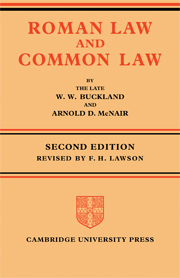Book contents
- Frontmatter
- Contents
- Preface
- Preface to the Second Edition
- Note on the 1965 Impression
- Introduction
- Abbreviations
- Chapter I THE SOURCES
- Chapter II THE LAW OF PERSONS
- Chapter III LAW OF PROPERTY
- Chapter IV LIMITED INTERESTS AND SERVITUDES
- Chapter V UNIVERSAL SUCCESSION
- Chapter VI OBLIGATIONS: GENERAL
- Chapter VII OBLIGATIONS: GENERAL (cont.)
- Chapter VIII PARTICULAR CONTRACTS
- Chapter IX QUASI-CONTRACT AND NEGOTIORUM GESTIO
- Chapter X DELICT AND TORT
- Chapter XI PARTICULAR DELICTS AND TORTS
- Chapter XII PROCEDURE
- Index
Chapter VII - OBLIGATIONS: GENERAL (cont.)
Published online by Cambridge University Press: 30 March 2010
- Frontmatter
- Contents
- Preface
- Preface to the Second Edition
- Note on the 1965 Impression
- Introduction
- Abbreviations
- Chapter I THE SOURCES
- Chapter II THE LAW OF PERSONS
- Chapter III LAW OF PROPERTY
- Chapter IV LIMITED INTERESTS AND SERVITUDES
- Chapter V UNIVERSAL SUCCESSION
- Chapter VI OBLIGATIONS: GENERAL
- Chapter VII OBLIGATIONS: GENERAL (cont.)
- Chapter VIII PARTICULAR CONTRACTS
- Chapter IX QUASI-CONTRACT AND NEGOTIORUM GESTIO
- Chapter X DELICT AND TORT
- Chapter XI PARTICULAR DELICTS AND TORTS
- Chapter XII PROCEDURE
- Index
Summary
IMPOSSIBILITY
In Roman law, as in ours, agreements for plain impossibilities, or on conditions involving plain impossibilities, are void, though, naturally, many things quite possible to us were thought of as impossible in Rome. There are some points of terminology which should be mentioned. Augustan and earlier Latin had no such word as impossibilis. Labeo has to express the idea in Greek, and Julian does the same, though by his time the word impossibilis had acquired citizenship. It never seems to have been very common. The more usual expression is ‘in rerum natura non esse’ or the like, in which the influence of Greek philosophy is evident. Though texts not infrequently use the word impossibilis without limitation to any particular type of what we should call impossibility, it does not seem ever to be specifically applied except to something to be done or given. To touch the sky with one's finger is impossible: that a son should be older than his father is still contra rerum naturam.
The rule laid down in the most general terms, ‘impossibilium nulla obligatio est’, and covering legal impossibility as well as physical, seems to apply in practice in our own law, though on the last application there is little authority. With us the line taken seems rather to be that the parties must have assumed possibility as the basis of the contract, so that it is theoretically, and perhaps practically, possible for a man to contract validly to perform an absolute impossibility.
- Type
- Chapter
- Information
- Roman Law and Common LawA Comparison in Outline, pp. 237 - 270Publisher: Cambridge University PressPrint publication year: 1952



